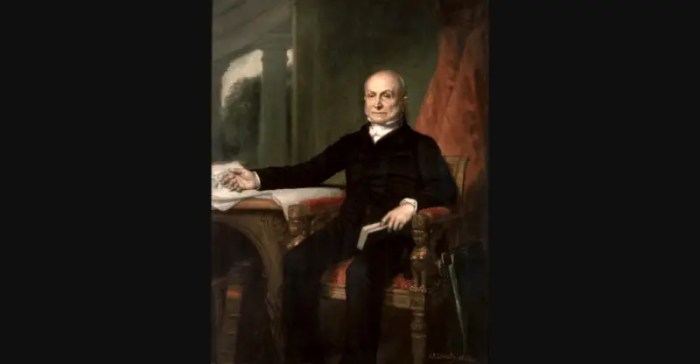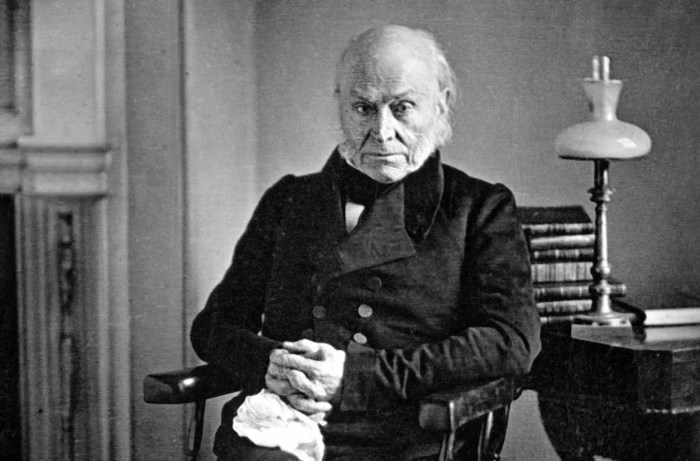Bad things john quincy adams did – John Quincy Adams’s presidency, marked by both accomplishments and controversies, left an enduring impact on American history. This narrative delves into the complexities of his actions, examining the expansion of slavery, treatment of Native Americans, suppression of dissent, and foreign policy failures that shaped his legacy.
Adams’s role in the expansion of slavery, including the annexation of Florida and the Missouri Compromise, remains a subject of debate. His policies towards Native American tribes, such as the Indian Removal Act, had devastating consequences for their communities. Additionally, Adams’s suppression of political opposition through measures like the Sedition Act raised concerns about the erosion of constitutional rights.
Expansion of Slavery in the United States

John Quincy Adams played a significant role in the expansion of slavery into new territories during his presidency. He was instrumental in the annexation of Florida and the passage of the Missouri Compromise, which had far-reaching consequences for the institution of slavery in the United States.
Annexation of Florida
In 1819, Adams negotiated the Adams-Onís Treaty with Spain, which resulted in the acquisition of Florida by the United States. This expansion of territory added a vast new area to the slave-holding South, further entrenching the institution of slavery in the country.
Missouri Compromise
In 1820, the Missouri Compromise was passed as a compromise between pro-slavery and anti-slavery factions in Congress. The compromise admitted Missouri as a slave state and Maine as a free state, maintaining a balance between the number of slave and free states in the Union.
However, it also established a line of latitude (36°30’N) above which slavery would be prohibited in newly acquired territories. This provision was a major concession to anti-slavery forces, but it also set the stage for future conflicts over the expansion of slavery.
Treatment of Native Americans

John Quincy Adams’s presidency marked a period of significant change in the United States’ relationship with Native American tribes. His policies, particularly the Indian Removal Act of 1830, had a profound impact on Native American communities, leading to forced relocation and loss of land.
Indian Removal Act
The Indian Removal Act, passed in 1830, was a key policy implemented by Adams’s administration. The act authorized the federal government to negotiate treaties with Native American tribes in the southeastern United States, with the goal of relocating them to Indian Territory (present-day Oklahoma).
The government promised land and financial compensation to tribes that agreed to move, but many resisted.
The forced relocation of Native Americans had devastating consequences for their communities. Many died during the journey to Indian Territory, and those who survived faced challenges in adapting to their new environment. The loss of their traditional lands also disrupted their cultural and economic practices.
Suppression of Dissent

John Quincy Adams, as President, enacted policies that restricted political opposition and dissent. A notable example is the Sedition Act of 1801, which criminalized the publication of “false, scandalous, and malicious” writings against the government. This law was widely criticized as an infringement on the First Amendment right to freedom of speech.
Sedition Act of 1801
The Sedition Act was passed in response to the growing criticism of Adams’ presidency by the Democratic-Republican Party. The law defined sedition as any writing that “incites, or tends to excite, an insurrection or resistance against the laws of the United States.”
It also made it a crime to “write, print, utter, or publish…any false, scandalous and malicious writing or writings against the government of the United States, or either house of the Congress of the United States, or the President of the United States.”The
Sedition Act was immediately challenged in court. In 1803, the Supreme Court ruled in Marbury v. Madison that the law was unconstitutional. However, the damage had already been done. The Sedition Act had been used to prosecute and imprison dozens of Democratic-Republican newspapers and editors.The
Sedition Act is a clear example of Adams’ willingness to suppress dissent. It is a reminder that the First Amendment right to freedom of speech is not absolute. In times of national crisis, the government may be tempted to restrict speech in order to protect the public.
However, such restrictions must be carefully tailored and must not be used to silence political opposition.
Foreign Policy Failures

John Quincy Adams’ presidency was marked by several foreign policy blunders that had significant consequences for the United States and international relations. These failures stemmed from Adams’ idealistic and ambitious approach to foreign policy, which often clashed with the realities of international politics.One
major failure was Adams’ attempt to mediate between Spain and its former colonies in Latin America. Adams believed that the United States could play a role in promoting peace and stability in the region, but his efforts were ultimately unsuccessful.
Spain refused to recognize the independence of its former colonies, and the United States was unable to prevent the outbreak of war between the two sides. This failure damaged Adams’ reputation and weakened the United States’ influence in Latin America.Another
foreign policy failure was Adams’ handling of the issue of slavery. Adams was a strong opponent of slavery, but he was unable to prevent the expansion of slavery into new territories. The Missouri Compromise of 1820, which Adams supported, temporarily resolved the issue of slavery in the territories, but it also set the stage for the eventual Civil War.Adams’
foreign policy failures had a lasting impact on the United States. They contributed to the growing sectionalism that would eventually lead to the Civil War, and they weakened the United States’ influence in Latin America. Adams’ failures also served as a cautionary tale about the dangers of idealism in foreign policy.
Consequences of Adams’ Foreign Policy Failures, Bad things john quincy adams did
The consequences of Adams’ foreign policy failures were far-reaching. The United States’ inability to mediate between Spain and its former colonies led to the outbreak of war in Latin America, which destabilized the region and weakened the United States’ influence.
The Missouri Compromise of 1820, which Adams supported, temporarily resolved the issue of slavery in the territories, but it also set the stage for the eventual Civil War. Adams’ failures also contributed to the growing sectionalism that would eventually lead to the Civil War.In
addition to these domestic consequences, Adams’ foreign policy failures also had a significant impact on international relations. The United States’ inability to prevent the outbreak of war between Spain and its former colonies damaged its reputation and weakened its influence in Latin America.
Adams’ handling of the issue of slavery also alienated many European countries, which were increasingly opposed to the institution of slavery. As a result, the United States found itself increasingly isolated on the international stage.
Helpful Answers: Bad Things John Quincy Adams Did
What were John Quincy Adams’s motivations for expanding slavery?
Adams’s motivations were complex, including political considerations to appease Southern states and economic interests to support the cotton industry.
How did the Indian Removal Act impact Native American tribes?
The act forced Native American tribes to relocate west of the Mississippi River, leading to significant loss of land, cultural disruption, and hardship.
What were the consequences of the Sedition Act?
The act restricted freedom of speech and press, leading to the imprisonment of political opponents and undermining democratic principles.
What were John Quincy Adams’s major foreign policy failures?
Adams failed to acquire Florida from Spain, mishandled relations with Britain, and faced criticism for his involvement in the Monroe Doctrine.